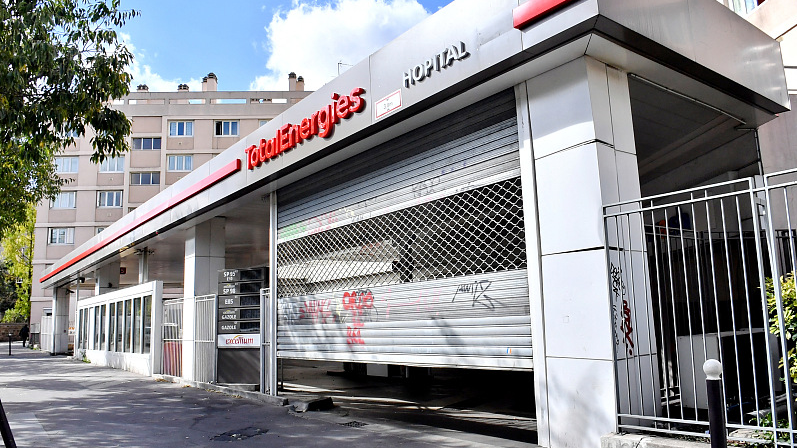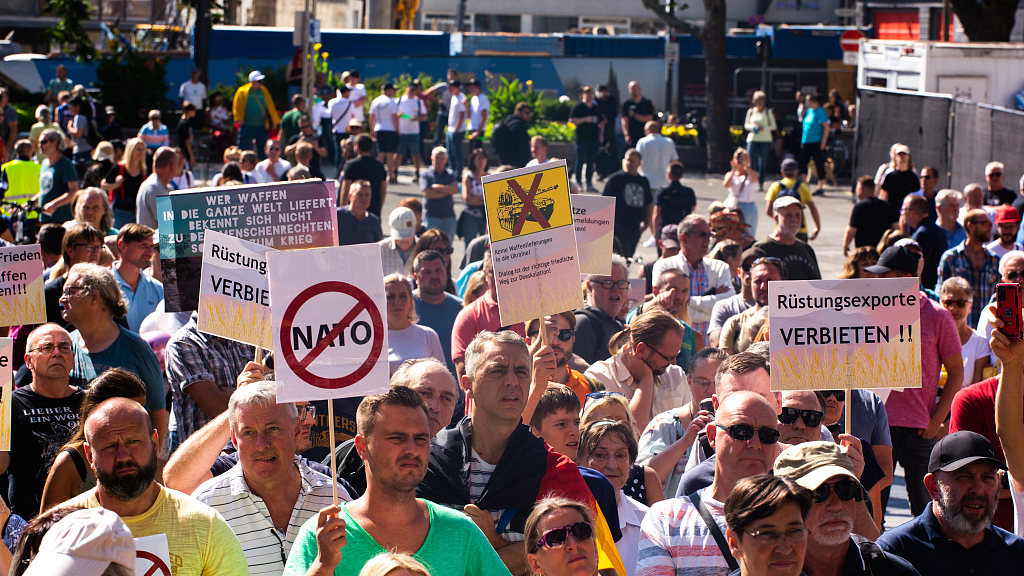
A temporarily closed Total Energies gas station is seen in Paris, France, October 6, 2022. /CFP
A temporarily closed Total Energies gas station is seen in Paris, France, October 6, 2022. /CFP
Editor's note: Bradley Blankenship is a Prague-based American journalist, political analyst and freelance reporter. The article reflects the author's opinions and not necessarily the views of CGTN.
According to an analysis released this week by PAQ Research, published by Czech Radio and based on the country's official data, up to 30 percent of households in the Czech Republic could fall into poverty on account of rising energy and housing costs.
Approximately one-quarter of families could have less than 100 crowns (less than $5) per person per month after paying for their basic living expenses. Up to 44 percent of families with children could succumb to poverty, according to analysis.
Most families could spend up to 34 percent of their monthly income on energy consumption, while households with children would see their share jump to a potential 40 percent. Furthermore, around 10 percent of all households could see their debts outweigh income, meaning they'd have to tap into savings or use credit lines.
This data is striking and shows the deleterious effects of Western-led sanctions on Russia that are creeping back into the homes of Czech Republic people. It's just one small country in the 27-member European Union, which stood at the forefront of implementing sanctions.
The situation demonstrates the de-globalization process occurring with Russia has inflicted much pain to most countries, particularly developed countries. It's practically impossible to isolate one economy, especially a major economy such as Russia, without facing consequent damage to others.
We have these effects for some time before the ongoing crisis in Ukraine. Prior to the "special military operation," the CPI (consumer price index) in Europe had been steadily rising. Moreover, tariffs on U.S. imports of phosphate fertilizers from places including Russia and Morocco, two leading producers, were already hiking costs and cutting off small U.S. farmers from the global market.
Likewise, the Wall Street Journal noted in January that, "European Union and U.S. sanctions on Belarus, a major exporter of potash, which is a key ingredient of mineral fertilizers" was another factor in surging global food prices. There have been hits to the global supply of oil thanks to unilateral sanctions by Washington against Iran, as well as Venezuela, which the U.S. are reversing, and major hits all across the economic spectrum due to the U.S. trade war against China.

About 2,000 protesters take part in a demo against NATO and demand an end to deliveries of weapons, Cologne, Germany, September 4, 2022. /CFP
About 2,000 protesters take part in a demo against NATO and demand an end to deliveries of weapons, Cologne, Germany, September 4, 2022. /CFP
Nonetheless, the issue is becoming more salient in the context of Europe and Russia. The primary engine of Europe's growth model has been consuming cheap Russian energy to produce goods to sell on the international market. With Russian liquified natural gas supplies to Europe dwindling and the prospects that Russian oil could halt altogether after Western nations placed a cap on the commodity. Ultimately, it could mean the de-industrialization of Europe with soaring joblessness and destitution.
Germany's May foreign trade balance showed a 1-billion-euro deficit (about $1.05 billion), the first of its kind in decades, which was followed by deficits by other EU nations. The EU collectively recorded its highest trade deficit in August, standing at 50.9 billion euros (about $53 billion), the highest deficit ever recorded according to Eurostat figures. Some have argued that this damage is temporary but the problem could be long-term, if not permanent.
This could result in a huge decline in European industrial output, on account of lower energy consumption. Some leaders are lauding this as a sign that Europe can weather a tough winter this season – but energy output is the benchmark whereby central banks forecast GDP growth rates, therefore lower energy consumption would lead to declining economic expansion. This would spell a deep and long-term recession.
According to forecasts for the Czech Republic: a staggering 30-percent poverty rate for a highly developed European country, which perennially has the lowest unemployment rate in the bloc. We see that de-globalization are undesirable, while it's important to maintain good living standards for the average person as any reasonable economist would agree.
(If you want to contribute and have specific expertise, please contact us at opinions@cgtn.com. Follow @thouse_opinions on Twitter to discover the latest commentaries on CGTN Opinion Section.)